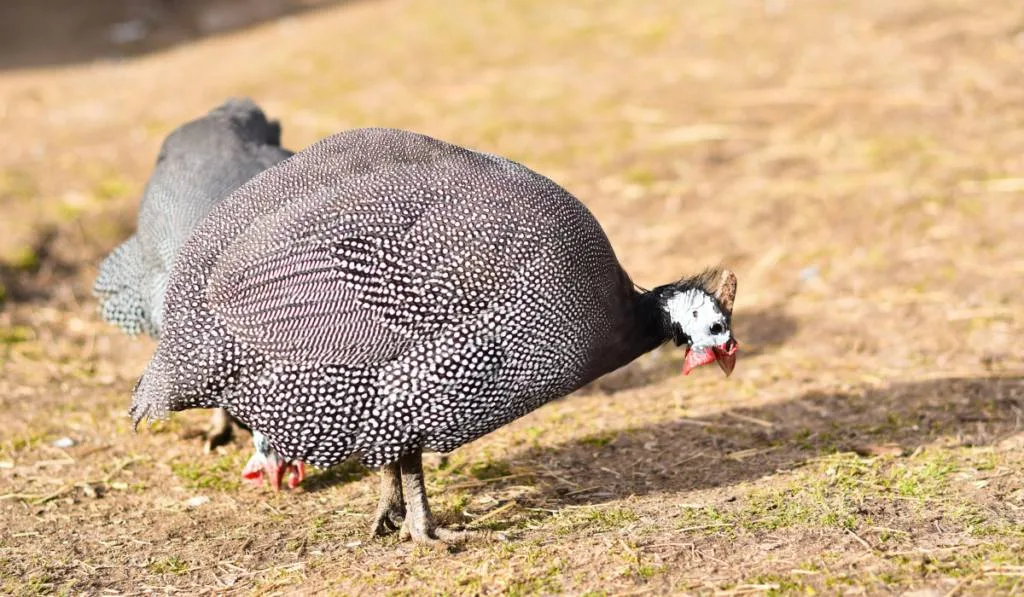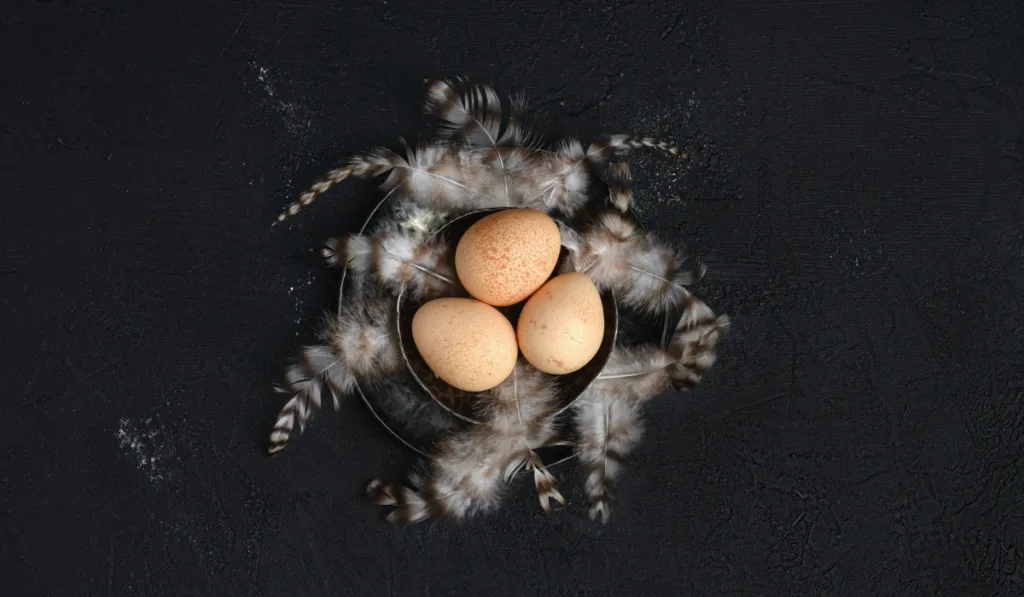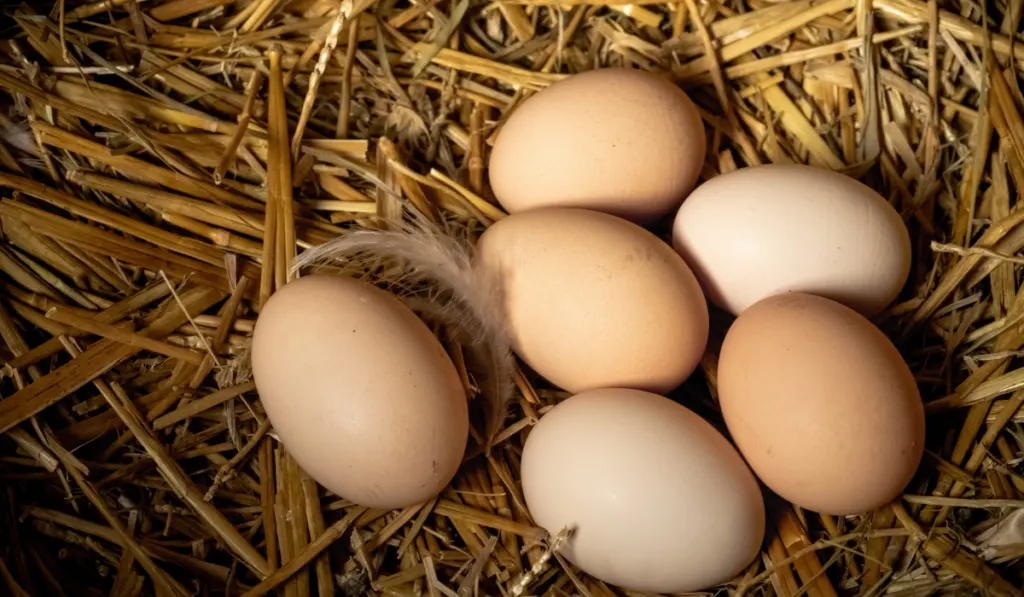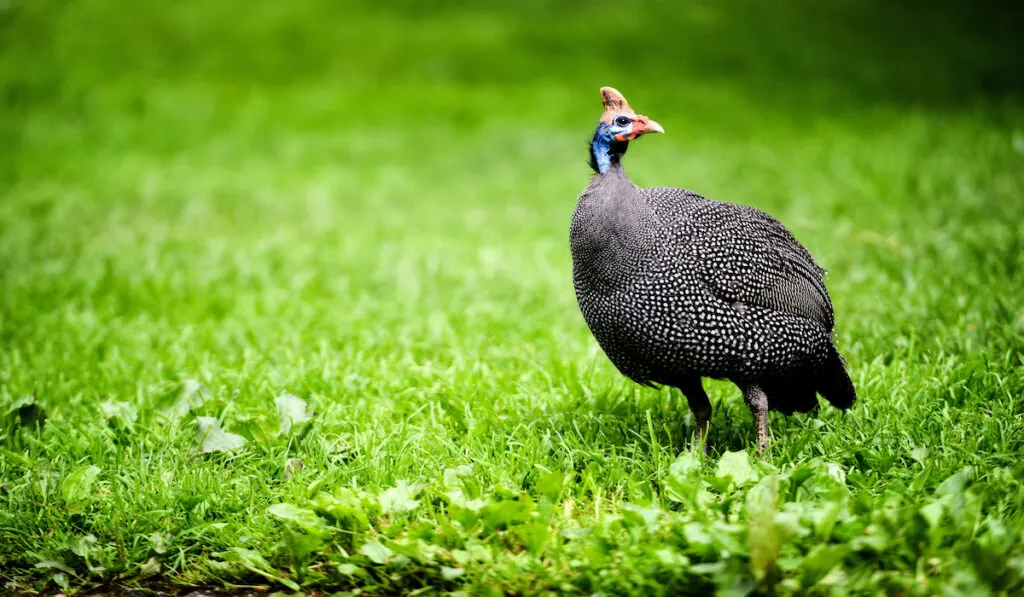When many people think poultry, their minds do not usually remember guineas. You could say their unbearable loudness makes them unpopular with some people.
But away from the noisiness, guineas can actually be beneficial to your farm. They also offer some advantages over chickens, ducks, and other regular poultry birds.
For one, guineas are relatively hardy and free of diseases. Besides, they could make do for a natural pest control system. More so, they can serve as food through their meat and the eggs they produce.
You might be wondering, do guineas lay eggs?
Well, yes, guineas do lay eggs.
But interestingly, while guineas have a similar weekly laying rate to ducks and chickens, their yearly average is relatively low. This low yield may be linked to the fact that guineas are seasonal layers.
They lay eggs between April and October or March and September. So, their yearly average of around 100 is logical.

Guinea fowl eggs are not the most common type of eggs, and we are sure you have many unanswered questions. To help satisfy your curiosities and clarify your doubts, we answer some guinea-egg-related questions in this post.
Table of Contents
Do Guineas Lay Eggs?
Guineas do lay eggs. In the first year of their lives, as early as 5 months, guinea hens may start laying eggs. But this is not a given.
Sometimes it does not come that early or even until after 12 months. All in all, guinea hens start laying eggs when they mature.
Guinea hens are seasonal layers. They typically will not lay eggs through winter.
Instead, they lay from spring till summer or fall, stopping when the days become shorter. Their laying season usually coincides with April to October.
The first 3 years of a guinea hen’s life are usually the most productive. During this period, she would lay an egg almost every day when in laying season. But as she gets older, this laying rate would fall.
Guineas are usually not fixed on a particular spot for laying their eggs. Offer them any suitable space, and you will find them building nests and laying eggs.
A suitable laying spot for a guinea is usually filled with long grass or any other landscape feature that can hide the eggs. Long grasses and similar landscape features help hide the guinea eggs from predators.
Guineas are a bit big on keeping predators away from their eggs. So you may find guinea cocks staying on the lookout while the hens do the laying.
Interestingly, sometimes guineas practice communal laying. In this arrangement, guinea hens collectively lay eggs into one nest until sufficient.
The collective yield from communal laying can sometimes be as high as 50. But it is typically around 20-30.

Once the clutch garners around 20 to 30 eggs, one hen will become broody and sit on the nest. Besides communal laying, guineas may also try out communal brooding. This arrangement involves the hens taking turns to sit on the eggs.
When brooding, guineas can remain on the nest for up to 28 days, only leaving for food and water. Even when they go in search of sustenance, they do not stay away longer than 20 minutes. They also do not usually leave their nest more than twice a day when broody.
What Do Guinea Eggs Look Like?
Overall, guinea eggs look like the eggs you would get from a chicken or a duck. However, they are generally smaller. The average guinea egg is about half the size of a duck egg or a large chicken egg.
The pointed end of guinea eggs is also pointier than what you would typically see in chicken or duck eggs.
Are Guinea Eggs Edible?
Yes, guinea eggs are totally edible. Their taste is quite similar to that of chicken eggs, but they have more yolk.
Their yolk has a richer flavor and texture. However, they may not match the intense taste of duck eggs.
Guinea eggs can be prepared in pretty much the same way as chicken eggs and duck eggs. You may have heard that guinea eggs taste like game, but this is not accurate.
If you are replacing chicken eggs or duck eggs with guinea eggs while baking, you would have to adjust your measurements.
Remember we said guinea eggs are smaller? Well, this means you would have to use more units of guinea eggs in place of chicken eggs or duck eggs while baking.
Generally, 10 guinea eggs correspond to 7 chicken eggs or 5 duck eggs.

Are Guinea Eggs Healthy?
Guinea eggs are healthy – bursting with various nutrients. For one, they contain many minerals, including those listed below:
- Sodium
- Potassium
- Zinc
- Copper
- Iron
- Magnesium
- Calcium
Besides minerals, guinea eggs contain a significant amount of protein. On average, whole guinea eggs contain about 10-14% protein, but this can be higher.
In fact, a study comparing eggs from chickens, quails, turkeys, and guineas suggested those from guineas have the highest protein content. (source)
Guinea eggs are also rich in fat, particularly their yolk. The fat content of guinea egg yolk is typically between 32 and 33%.
In the study earlier cited, guinea eggs had more fat than the other samples. The good thing about the fat in guinea eggs is that it contains significant amounts of Omega-3 fatty acids. (source)
Guinea eggs are also a decent source of dietary cholesterol. It is estimated that guinea egg yolks contain around 1.5-1.8 grams of cholesterol per 100 grams. (source)
Like most other eggs, guinea eggs have a rich profile of B vitamins. They contain folate, vitamin B1, vitamin B2, Vitamin B3, pantothenate (B5), and pyridoxine (B6). It also provides choline – a nutrient similar to B-vitamins.
Eggs from guinea hens also contain significant amounts of fat-soluble vitamins. They offer vitamins A, D, E, and K. Although E and K are present in trace amounts.
The levels of vitamin A in guinea eggs are generally higher when the guineas are allowed to sustain themselves mainly by foraging. You will find that foraging guineas lay eggs with intensely colored yolks.
Such yolks contain beta-carotene, which can be converted into vitamin A in the body. They also contain lutein and zeaxanthin, which are carotenoids with similar effects as vitamin A.
What Do Guinea Eggs Taste Like?
Guinea eggs are said to taste like chicken eggs. Although, in some cases, people say they are creamier than chicken eggs. But since guinea eggs have a higher yolk-to-egg-white ratio, the extra creaminess is plausible.

How Many Eggs Do Guineas Lay?
During their laying season, guinea hens lay eggs almost every day. So, in a week, they can produce as many as 6-7 eggs.
However, in a year, they will only produce as many as 80 to 160 eggs. This is a consequence of the seasonality of their egg production. But beyond that, guineas usually lay their eggs in clusters.
They would lay around 30 eggs, go for a break, then repeat the same process 3 times more. So, in all, they would lay 4 batches of about 30 eggs in a year.
How Much Do Guinea Eggs Sell For?
Guineas eggs are rarer than chicken eggs for apparent reasons. You can expect them to cost more than chicken eggs.
A dozen chicken eggs may cost up to $3 to $5. But a single guinea egg may cost as much as $1.
Summary
Guineas lay eggs like most other birds. But they are seasonal layers, and they only lay for a short period.
So, when compared to ducks and chickens, they are not as productive. In a year, guineas produce an average of 100 eggs.
Resources
- https://thehipchick.com/do-guinea-fowl-lay-eggs/
- https://www.motherearthnews.com/homesteading-and-livestock/7-major-advantages-of-keeping-guinea-fowls-in-your-homestead-zbcz1611
- https://www.heritageacresmarket.com/how-many-eggs-does-a-chicken-lay-a-day/
- https://animals.mom.com/average-number-eggs-duck-lays-7536.html
- https://guinea-fowl.com/guineas/Guinea-fowl-eggs.html
- https://morningchores.com/guinea-fowl-eggs/
- http://www.fourseasonsfam.com/wordpress/2020/07/09/nutritional-value-of-guinea-eggs-and-duck-eggs/
